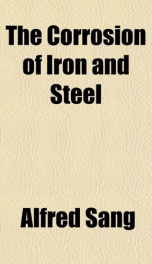the corrosion of iron and steel

Purchase of this book includes free trial access to www.million-books.com where you can read more than a million books for free. This is an OCR edition with typos. Excerpt from book: Where pitting is serious, corrosion may reach through a plate long before the greater part of the surrounding surface is seriously rusted. Were corrosion to take place evenly, the life of the material would be greatly extended. In proof of this Mallet made a series of experiments-; they were carried out on large surfaces and at ordinary temperatures over a long period of time; he found the following average relative depths of corrosion, corrected for one centurv of time, for steel and wrought iron taken together: In the atmosphere and freely exposed to the weather 0.0343 of an inch Tn fresh river water 0.0352 " " '' In clear open sea-water 0.3263 " " " In sew age- fouled sea-water 0.5327 " " " The tables of actual results with various grades of iron and steel which yielded the above averages are very instructive, although the chemical compositions and physical conditions must in many, if not all, cases have differed from those of equivalent qualities manufactured nowadays. As seasons and conditions recur, rust forms in layers which can be detached from each other. Tieing more or less spongy and perhaps hygroscopic, it will retain moisture in close proximity to the iron, besides giving rise to an unfavorable voltaic action. Prof. W. H. Gee states" that a bright steel in contact with the same steel after rusting 24 hours in the atmosphere of Manchester, showed a difference of potential of 0.104 v- Rust in contact with iron hastens its corrosion by acting, therefore, as a depolarizer; it is very voluminous andmay occupy as much as ten times the space of the original iron (Ward and Bauerman). It may also act as a carrier for oxygen, furnishing it to the iron and replacing it from the air. These properties promote the growth of rust both laterally and in depth. ...
Info about the book
Author:
Series:
Unknown
ISBN:
0554452480
Rating:
3.5/5 (4)Your rating:
0/5
Languge:
English
Users who have this book
Users who want this book
What readers are saying
What do you think? Write your own comment on this book!
write a commentif you like the corrosion of iron and steel try:
Other books by this author
Do you want to exchange books? It’s EASY!
Get registered and find other users who want to give their favourite books to good hands!

